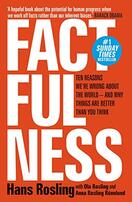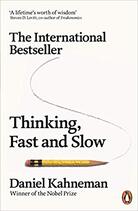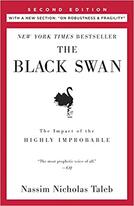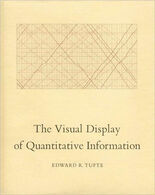Factfulness: Ten Reasons We're Wrong About the World -and Why Things Are Better Than You Think by Hans Rosling (2018) Our very first blogpost on askyourdata.co from January 2017 was inspired by Hans Rosling's fact-based worldview and the tons of high-quality material and data the Rosling's and their fellows had piled together at gaprminder.org. Sadly, Rosling passed away in February 2017. One can go as far as to call Factfulness, Rosling's last book he had written with his son and daughter-in-law, his legacy. Factfulness is in essence a plea against seeing today's world in a "binary", black-or- white, rich-or-poor manner. One reflection of this are four generic income levels Rosling suggests instead of “rich and poor”. This is what Bill Gates, a personal friend of Rosling and fan of Factfulness says about that: Hans compares this [..] to standing on top of a skyscraper and looking down at a city. All of the other buildings will look short to you whether they're ten stories or 50 stories high. It’s the same with income. Life is significantly better for those on level 2 than level 1, but it’s hard to see that from level 4 unless you know to look for it. The main part of the book is structured along ten human instincts (e.g. fear instinct, size instinct etc.) that prevent us from fully perceiving the world as well as gradual developments and improvements as they are. Factfulness is not a mere 350-page-stream of undifferentiated optimism and positivity. Rosling names the threats and risks humankind is confronted with (climate change, global economic crisis etc.). A fascinating level of differentiation is maintained from the very first to the very last page. Thinking Fast and Slow by Daniel Kahnemann (2012) The fact that Daniel Kahnemann won a Nobel prize for economics in 2002 does not make this book a good read per se. In Thinking Fast and Slow, Kahnemann takes us on a tour de force through human thinking and decision making. The sheer quantity of insights Daniel Kahnemann and Amos Tversky, his main research partner who deceased in 1996, developed over time is breath-taking. Kahnemann shows us that there are essentially two ways of human thinking. The first system is fast thinking which happens almost automatically and instinctively. This is the predominant way of thinking. The second system is the one of slow thinking. It is capable of rational thought and conscious decision making but takes more of a person's energy and concentration. Kahnemann and Tversky have coined the research on cognitive biases. For instance, the two conducted the first study on the anchoring effect that drives the perception of figures and decision making on a subconscious level. This can serve as an interesting baseline for fundraising appeals (e.g. use large numbers in texts to increase average donations). Thinking Fast and Slow is the lifetime achievements of two of the most influential contemporary psychologists within one book. The hardcover is a 450page+ read, i.e. not something for a rainy autumn weekend alone. I can recommend the audiobook, particularly for a commute. There is an extensive amount of related material on the web. The Black Swan: The Impact of the Highly Improbable by Nassim Nicholas Taleb (2015) Nassim Nicholas Taleb's book has been a global bestseller of popular science since it was first published in 2008. Also Daniel Kahnemann refers to Taleb in Thinking Fast and Slow and admits that his thinking at a later stage of his career was strongly influenced by Taleb. Although the book has also be criticized by renowned reviewers for its partial lack of empirical evidence, intensive use of anecdotes and messy structure, we find it a worthwhile read. The key themes of the book are limitations of predictions and the occurrence of presumably “impossible events” – just like black swans were to Europeans before they were first sighted in Australia. Taleb was a successful Wallstreet trader and quantitative analyst before becoming a successful author. This is why he argues that the unexpected is not only key to the understanding of financial markets but of history as a whole. This “holisitic” attempt by Taleb might be aiming a bit too high. However, The Black Swan is a thought-provoking and entertaining read. Visual Display of Quantitative Information by Edward Tufte (2001) The history of data visualization goes back many centuries. In a world of growing „datafication“, the visual display of quantitative information is growing more and more important. We have dedicated a whole section of blogposts to this exciting topic. Edward Tufte’s book Visual Display of Quantitative Information is a highly valuable read for everyone that has to visualize data and communicate insights. Tufte advocates a quite radical „less is more“-approach when it comes to visualizing data. This means for example that, with insufficient data, a simple table might be preferable compared to creating any chart. If charts are used, no drop of ink should be wasted as Tufte continuously proclaims clarity, precision and efficiency in data visualization. The book is not only insightful for producers of quantitative information but also for recipients, i.e. basically everyone reading a management report, newspapers, blogs etc. Data visualizations can sometimes tend to distort the underlying information in order to be more persuasive. This is what Tufte calls the “lie factor”, i.e. the size of effect shown in the visualiation in relation to the effect size in the actual data. Visual Display of Quantitative Information is a very recommendable extension to every analyst's , data scientist's and information designer's library. Are there any books, papers, webinars and talks you can recommend for long and dark evening? Don´t hesitate to post comments and / or stay in touch with the team of askyourdata.co.All the best and read you soon, Johannes
2 Comments
Eva
11/5/2019 12:25:15 am
Thank you for this nice list, Johannes! I'm reading Kahnemanns 'Thinking Fast and Slow' at the moment.
Reply
Johannes
11/5/2019 03:40:07 am
Thank you, Eva. Hope you enjoy it!
Reply
Leave a Reply. |
Categories
All
Archive
June 2024
|
